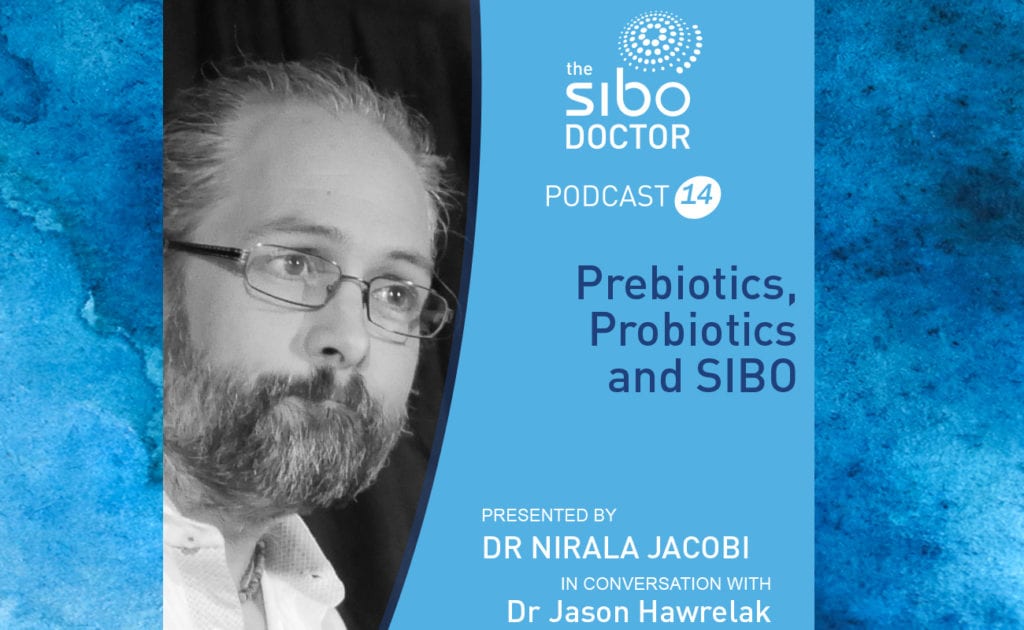Pre and Probiotic Use in SIBO
In this episode Dr Nirala Jacobi is in conversation with Dr Jason Hawrelak on the topic of all things gut.
Dr Hawrelak is a researcher, lecturer, naturopath, and nutritionist with over 16 years of clinical experience. He also practices at Gould’s Natural Medicine – a 135 year old natural medicine apothecary and clinic in Hobart, Tasmania, Australia.
Dr Hawrelak completed his PhD examining the capacity of probiotics, prebiotics, and herbal medicines to modify the gastrointestinal tract microbiota. He is currently the senior lecturer in Complementary and Alternative Medicines at the University of Tasmania’s School of Medicine where he coordinates the evidence based complementary medicines programs. Dr Hawrelak also teaches the gastrointestinal imbalances unit, within the Masters of Science and Human Nutrition, and Functional Medicine Program at the University of Western States, in Portland, Oregon.
Topics discussed in this episode include:
- Dr Hawrelak’s 2016 lecture on Pre and Probiotics at the SIBO Summit 2017 – still available to practitioners as part of the SIBO Fundamentals online course.
- The website Dr Hawrelak developed, Probiotic Advisor, to help practitioners differentiate which probiotic strains and products are appropriate to different conditions.
- Recent probiotic research (2017) in relation to SIBO treatment and methane reduction.
- The importance of strain specificity in relation to therapeutic effect.
- Reseeding the gut with exogenous probiotics as an outdated concept, and the history of this ideology.
- Fecal transplants and the capacity of strains to remain in the gut as compared to probiotics taken in capsule form that do not.
- What metabolic modulation actions do probiotics have in the body, and how to integrate this with background changes to enhance therapeutic effect.
- D-lactate V.S. L-lactate producing probiotic strains, and what systemic effects do each trigger?
- D-lactic acidosis and when this may occur.
- SIBO related symptom presentation and strain specificity for probiotic therapy, for symptoms such as motility issues, abdominal hypersensitivity, histamine issues, food reactions.
Motility
- Probiomax for motility Bifidobacterium Lactis HNO19 – 1-2 capsules per day.
- BB12 Bifidobacterium Lactis for motility.
- Suggestions on the combination use in children with constipation.
- Animal study showing probiotic strains that work on the migrating motor complex function – prokinetic potential.
- Combination of L. Rhamnosus GG, Bifidobacterium BB12, and inulin.
Abdominal hypersensitivity in SIBO
- Bifidobacterium Infantis 35624
- Align
- Rhamnosus GG
- Functional abdominal pain in kids – meta analysis supporting this therapeutic application.
- Nissle 1917 strain of E.Coli
- Bifidobacterium Lactis DN173010
- Speed up transit time
- Decrease pain and bloating
- Yoghurt brand, Activia, available in US, is the only available form (as currently known)
Leaky Gut
- Probiotics useful in helping to repair leaky gut
- Rhamnosus LGG
- Biocodex preparation of Saccharomyces Cerevisiae/Boulardii
Histamine Intolerance
- Infiltration of mast cells into the intestinal wall in SIBO and histamine implication.
- Probiotics and histamine degradation – investigating
- Rhamnosus
- Infantis
- Plantarum
- Probiotics and histamine upregulation – investigating
- Casei
- Bulgaricus
- High fat diets producing many bile salts, which feed hydrogen sulfide producing bacteria, and hydrogen sulfide gas contributing to leaky gut.
- Higher fat diets contributing to diamine oxidase (DAO) enzyme overuse in the small intestine and why this is relevant to histamine.
- Ketogenic diets and symptom resolution – why is this, and is it sustainable?
- Impact of starving out butyrate producing colonic flora.
- The risk of ketogenic diets.
Continued
- How to reintroduce foods to sensitive patients
- Heal gut
- Decrease inflammation
- Work on allergy axis to increase dietary diversity
- Partially hydrolysed guar gum (PHGG) as a prebiotic
- Probiotics as aiding in the recovery of the microbiome after an insult, eg chemotherapy, antibiotics, radiotherapy etc.
- Prebiotics and changes of diet having a greater impact on the gut microbiome.
- Jason’s prebiotic use
- PHGG – use in functional constipation patients, non-methane type SIBO, and diarrhoea type stool conditions.
- Helps to normalise stool.
- Bimuno – galacto oligosaccharides
- Bringing bifidobacterium, and faecalibacterium prausnitzii populations back.
- Faecalibacterium prausnitzii:
- The single species with the highest prevalence in healthy people.
- Predominant butyrate producer.
- Produces another anti-inflammatory gut healing compound, so helpful for inflammatory bowel diseases.
- Higher levels as protective against metabolic syndrome and Type 2 Diabetes.
- Akkermansia
- Accounts for 1-3% of microbiome in healthy people.
- Eats mucin, therefore if inflamed guts producing a lot of mucus can overgrow akkermansia.
- Lactulose
- Use as a prebiotic.
- Increases faecalibacterium prausnitzii, akkermansia, and bifidobacteria, lactobacilli.
- Use as a pH changer – moves environment to be more beneficially acidic.
- Amazing capacity to decrease bacteroides numbers – which can increase after multiple courses of antibiotics.
- SIBO positive on Lactulose breath test patients – to attend to SIBO with therapy first before using Lactulose as a prebiotic.
- Lactulose use in recurrent urinary tract infections as supported by clinical trials – as it decreases levels of E.coli in the gut so less pathogens can make the journey from anus, to vagina, to urethra.
- Prokinetic for small intestine and when it is appropriate to use it in SIBO.
- Note: lactulose will increase gas, but not bloating. If bloating, cease use.
- Discussion on soil based organisms as they relate to functional digestive disorders.
- Faecalibacterium prausnitzii:
- Bringing bifidobacterium, and faecalibacterium prausnitzii populations back.
- PHGG – use in functional constipation patients, non-methane type SIBO, and diarrhoea type stool conditions.

